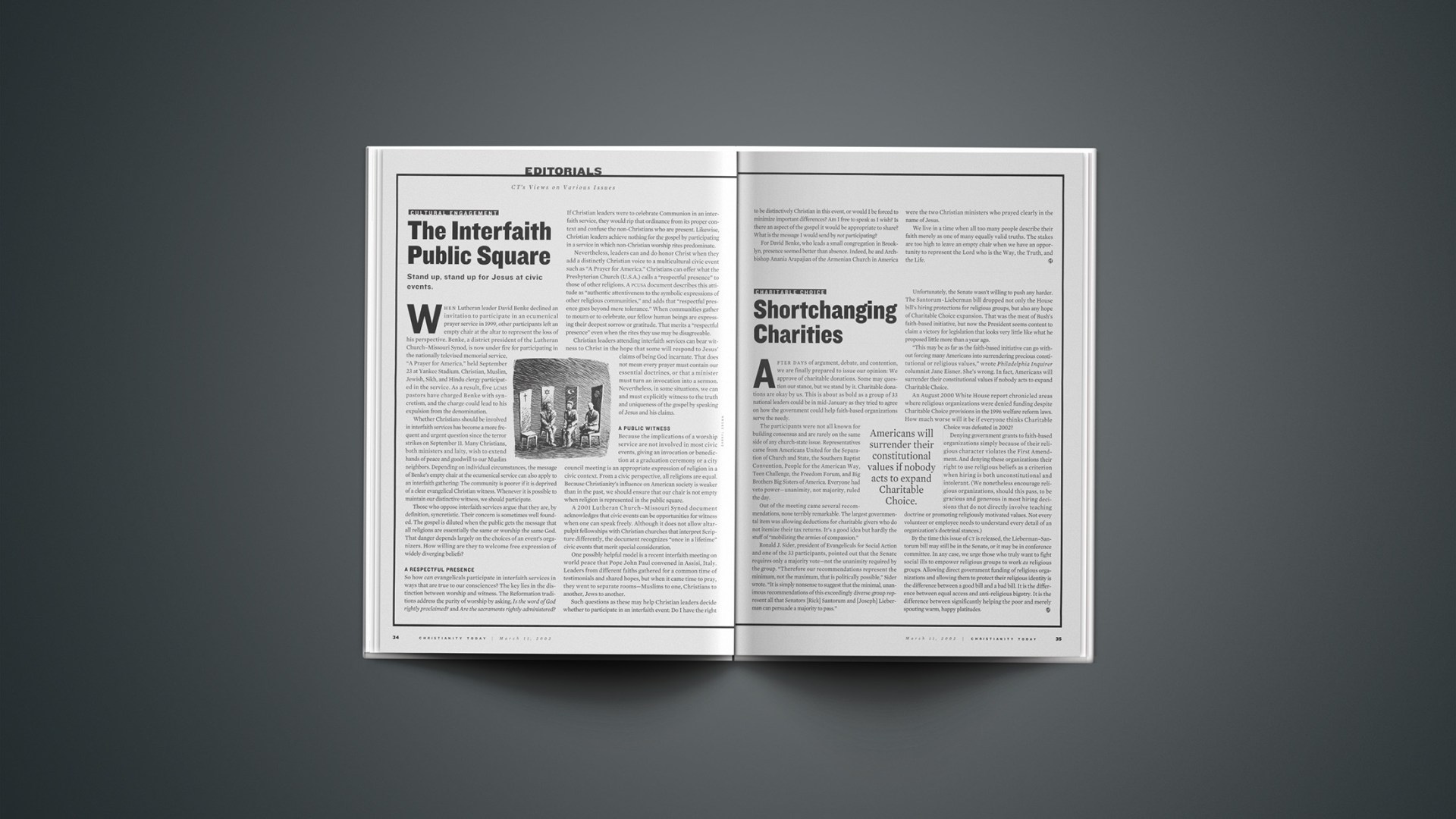When Lutheran leader David Benke declined an invitation to participate in an ecumenical prayer service in 1999, other participants left an empty chair at the altar to represent the loss of his perspective. Benke, a district president of the Lutheran Church-Missouri Synod, is now under fire for participating in the nationally televised memorial service, “A Prayer for America,” held September 23 at Yankee Stadium. Christian, Muslim, Jewish, Sikh, and Hindu clergy participated in the service. As a result, five lcms pastors have charged Benke with syncretism, and the charge could lead to his expulsion from the denomination.
Whether Christians should be involved in interfaith services has become a more frequent and urgent question since the terror strikes on September 11. Many Christians, both ministers and laity, wish to extend hands of peace and goodwill to our Muslim neighbors. Depending on individual circumstances, the message of Benke’s empty chair at the ecumenical service can also apply to an interfaith gathering: The community is poorer if it is deprived of a clear evangelical Christian witness. Whenever it is possible to maintain our distinctive witness, we should participate.
Those who oppose interfaith services argue that they are, by definition, syncretistic. Their concern is sometimes well founded. The gospel is diluted when the public gets the message that all religions are essentially the same or worship the same God. That danger depends largely on the choices of an event’s organizers. How willing are they to welcome free expression of widely diverging beliefs?
A Respectful Presence
So how can evangelicals participate in interfaith services in ways that are true to our consciences? The key lies in the distinction between worship and witness. The Reformation traditions address the purity of worship by asking, Is the word of God rightly proclaimed? and Are the sacraments rightly administered? If Christian leaders were to celebrate Communion in an interfaith service, they would rip that ordinance from its proper context and confuse the non-Christians who are present. Likewise, Christian leaders achieve nothing for the gospel by participating in a service in which non-Christian worship rites predominate.
Nevertheless, leaders can and do honor Christ when they add a distinctly Christian voice to a multicultural civic event such as “A Prayer for America.” Christians can offer what the Presbyterian Church (U.S.A.) calls a “respectful presence” to those of other religions. A pcusa document describes this attitude as “authentic attentiveness to the symbolic expressions of other religious communities,” and adds that “respectful presence goes beyond mere tolerance.” When communities gather to mourn or to celebrate, our fellow human beings are expressing their deepest sorrow or gratitude. That merits a “respectful presence” even when the rites they use may be disagreeable.
Christian leaders attending interfaith services can bear witness to Christ in the hope that some will respond to Jesus’ claims of being God incarnate. That does not mean every prayer must contain our essential doctrines, or that a minister must turn an invocation into a sermon. Nevertheless, in some situations, we can and must explicitly witness to the truth and uniqueness of the gospel by speaking of Jesus and his claims.
A Public Witness
Because the implications of a worship service are not involved in most civic events, giving an invocation or benediction at a graduation ceremony or a city council meeting is an appropriate expression of religion in a civic context. From a civic perspective, all religions are equal. Because Christianity’s influence on American society is weaker than in the past, we should ensure that our chair is not empty when religion is represented in the public square.
A 2001 Lutheran Church-Missouri Synod document acknowledges that civic events can be opportunities for witness when one can speak freely. Although it does not allow altar-pulpit fellowships with Christian churches that interpret Scripture differently, the document recognizes “once in a lifetime” civic events that merit special consideration.
One possibly helpful model is a recent interfaith meeting on world peace that Pope John Paul convened in Assisi, Italy. Leaders from different faiths gathered for a common time of testimonials and shared hopes, but when it came time to pray, they went to separate rooms—Muslims to one, Christians to another, Jews to another.
Such questions as these may help Christian leaders decide whether to participate in an interfaith event: Do I have the right to be distinctively Christian in this event, or would I be forced to minimize important differences? Am I free to speak as I wish? Is there an aspect of the gospel it would be appropriate to share? What is the message I would send by not participating?
For David Benke, who leads a small congregation in Brooklyn, presence seemed better than absence. Indeed, he and Archbishop Anania Arapajian of the Armenian Church in America were the two Christian ministers who prayed clearly in the name of Jesus.
We live in a time when all too many people describe their faith merely as one of many equally valid truths. The stakes are too high to leave an empty chair when we have an opportunity to represent the Lord who is the Way, the Truth, and the Life.
Copyright © 2002 Christianity Today. Click for reprint information.
Related Elsewhere
During the Lutheran Church-Missouri Synod controversy, Christianity Today interviewed several Christian leaders to find under what circumstances it is appropriate for Christians to worship or pray with non-Christians in ‘Praying in Their Midst.’
Media coverage of the controversy includes:
Five charge Benke with syncretism — LCMSNews (Dec. 13, 2001)
Ruling voids charges against Kieschnick — LCMSNews (Dec. 11, 2001)
The limits of religious unity — The Washington Post (Nov. 24, 2001)
For more information on Pope John Paul’s peace summit in Assisi, Italy, see Christianity Today’scoverage and the official Vatican site.










